15 years ago, I was going through an existential crisis:
- My first book had failed.
- My business was barely paying the bills.
- I was working with soul-sucking, demanding, difficult clients.
So, I did what any courageous (or crazy, as some might say) person would do…
I shut down the business and pursued my true passion—the science of people. I mastered the art of public speaking and changed my entire business model.
And you know what??
Going through this crisis was the best thing that ever happened to me. Because the website you’re on now is the result of the hardship I went through.
Today I’m going to show you a science-backed framework to help you get out of a funk.
First, let’s break it down to the fundamentals.
What Is an Existential Crisis? (Meaning)
An existential crisis, also known as existential dread, anxiety, or anguish, is a period of time where a person may feel a lack of meaning or purpose in their life. People experiencing an existential crisis commonly report a great sense of apathy, purposelessness, and lack of motivation, usually lasting a few months or longer.

The research lab here at Science of People conducted a survey, gathering data from 250 unique individuals (thank you, survey-takers!). Many of them even experienced existential crises themselves. These numbers might surprise you:
4 Existential Crisis Statistics You Should Know
- 67.9% of people said they’ve experienced an existential crisis.
- The leading cause of an existential crisis is a lack of purpose or calling, followed by career or finance-related difficulties.
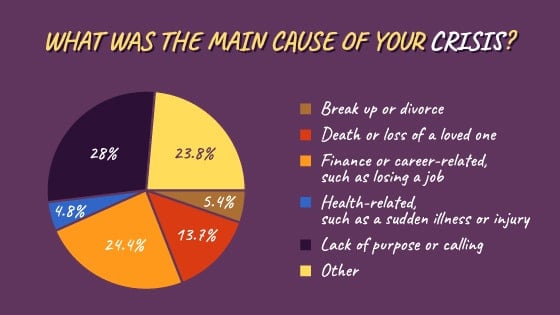
- 19.4% of people said their existential crisis lasted between 3–6 months. 34.7% said they are still going through one.
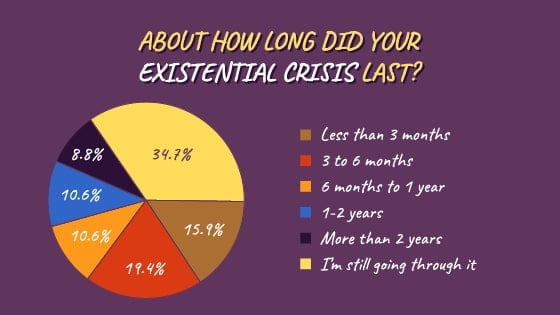
- 59.5% said they know someone else who has been in an existential crisis.
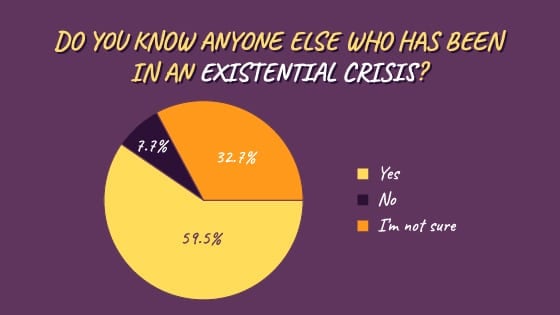
What Type of Existential Crisis Are You Going Through? (Quiz)
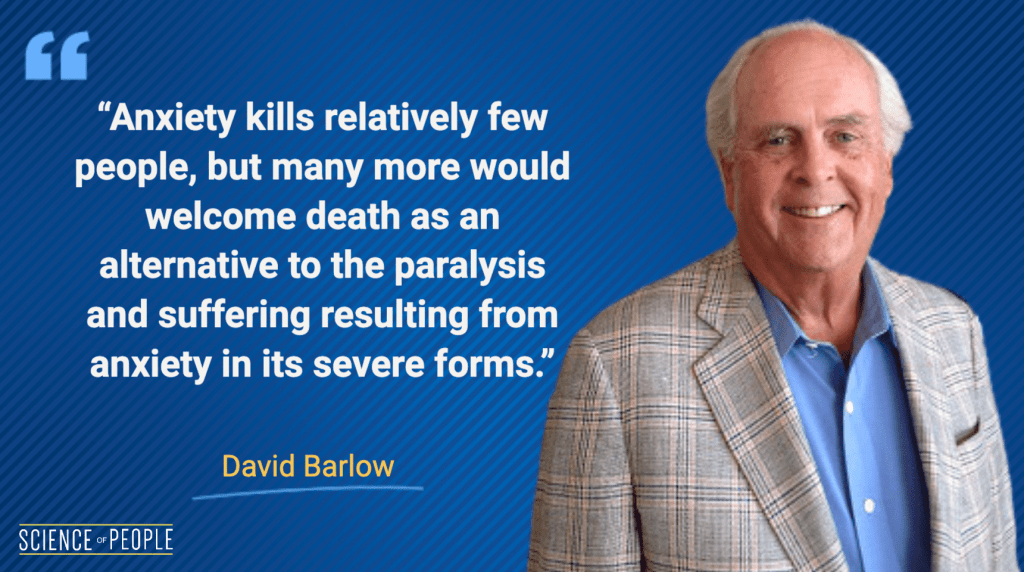
Alright, how do you know if you’re going through an existential crisis? Whether you’re a twentysomething or you’re in a midlife crisis—anyone can experience an existential crisis.
I found there are 5 types of crises. Take this 2-minute self-test to see what type of crisis you have.
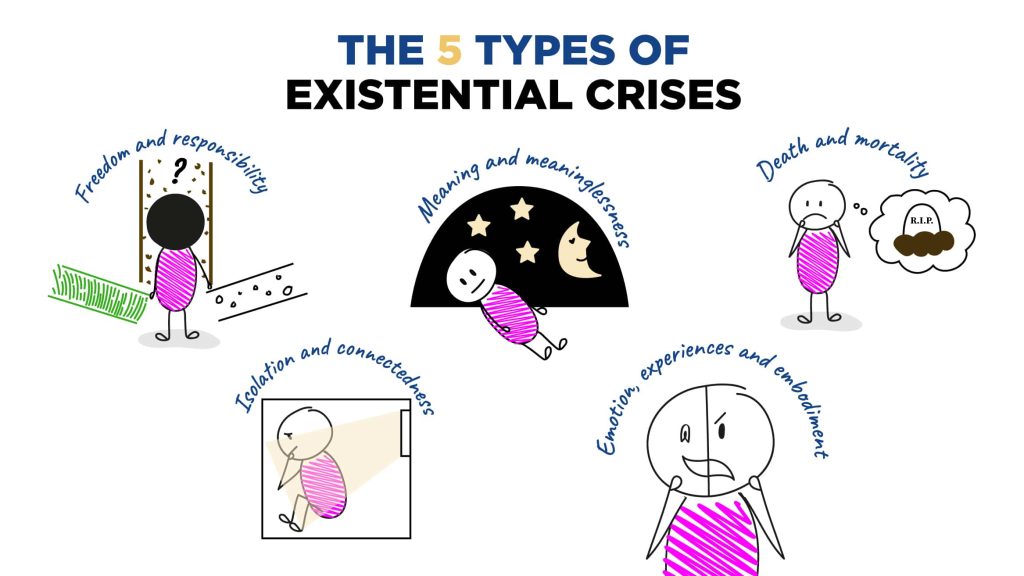
For the following 4 questions, make a mental note of the letter that best describes you.
- If I could have a superpower, it would be:
- A. The ability to fly
- B. Being able to live as long as I want
- C. Mind reading
- D. The ability to heal others
- E. Being happy all the time
2. When I wake up in the morning, my biggest worry is:
- A. How to go about starting my day
- B. My impending death or illness
- C. Being alone
- D. Not making a big enough impact
- E. Not finding happiness
3. My friends or family would say my biggest weakness is:
- A. Being indecisive
- B. Stressing out about health or old age
- C. Not being able to form strong relationships
- D. Having no passion in life
- E. Being too negative
4. Which of these situations has caused you the most amount of stress recently?
- A. Seeing different paths my life could take but not knowing which choice is the “right” one.
- B. Death of a loved one
- C. Not being able to connect with others
- D. Not knowing my purpose in life
- E. Trying to remain happy, even with negative emotions
Great! You finished the quiz. Now did one letter stand out above the rest?
- If you scored more As: You have a crisis of freedom and responsibility. You wish you had more freedom to make choices, but even these choices can be overwhelming and lead to indecisiveness and inaction.
- If you scored more Bs: You have a crisis of death and mortality. Old age or an illness may cause you to think about the meaning of life and what comes after death.
- If you scored more Cs: You have a crisis of isolation and connectedness. You may feel anxious about being alone and wish you had more quality connections.
- If you scored more Ds: You have a crisis of meaning and meaninglessness. You may have a dead-end job or feel like you’re just “getting by” in life. A lack of significance or making a difference may cause you anxiety.
- If you scored more Es: You have a crisis of emotion, experiences, and embodiment. If this is you, you tend to block out negative emotions and try to only feel positive. However, blocking out pain, anger, and grief may only lead to more suffering.
The key you should know is this:
There are many types of existential crises, and you can be experiencing more than one type.
OK, so you’ve got a good idea of the 5 types of existential crises. Now let’s take a look at some real-life problems you may be facing. Can you relate to these symptoms?
10 Signs You’re Going Through an Existential Crisis
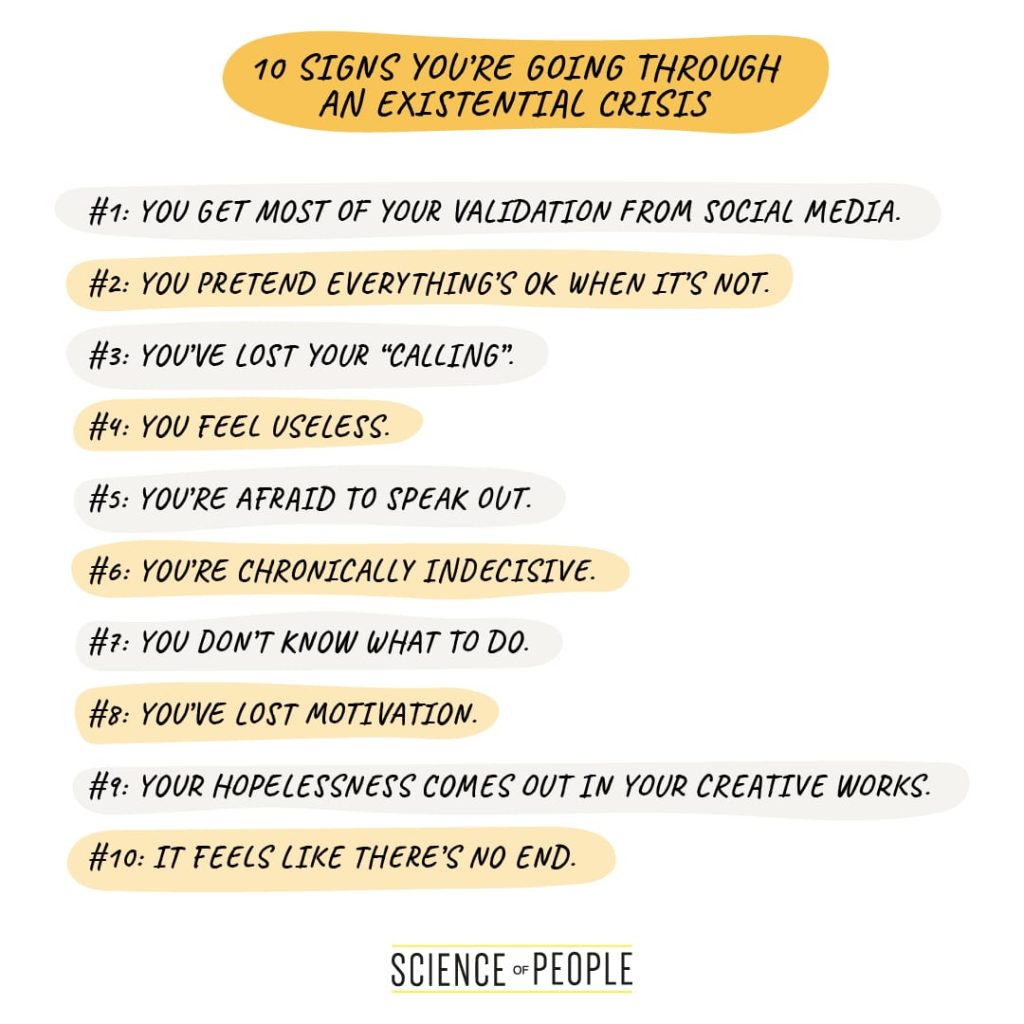
#1: Social media becomes your main source of validation.
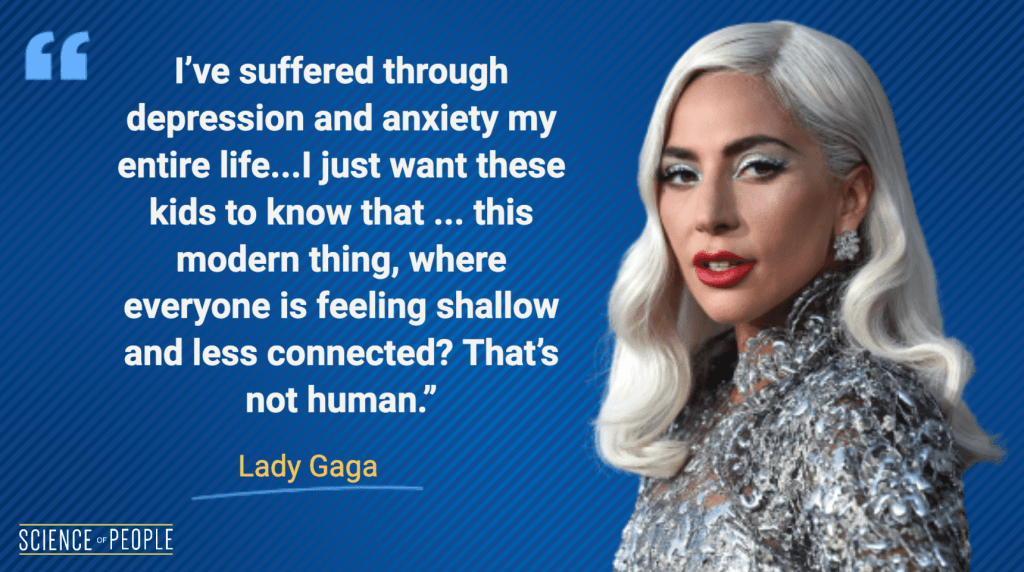
#2: You greet people with a bright smile, even if you’re dying inside.
“No motivation to exercise or even care for myself. Told family and friends I was loving the freedom, but I was sinking deeper and deeper on the inside.” — Susan, Science of People reader
#3: You’ve lost your calling in life.
“Where I thought I had a calling as a minister of religion but was bullied out by the men because I was a woman. Lost everything when I had to leave the church. Spent years flailing trying to work out what my purpose was now that my ‘calling’ was gone.” — Imogen, Science of People reader
#4: “I hate myself” becomes your slogan.
“My most recent crisis was based on the fact that I simply didn’t feel like I was contributing a net positive to the world. Indeed, I rather felt like I was producing a negative affect which made me feel rather purposeless.” — Josiah, Science of People reader
#5: You’re afraid to speak out.
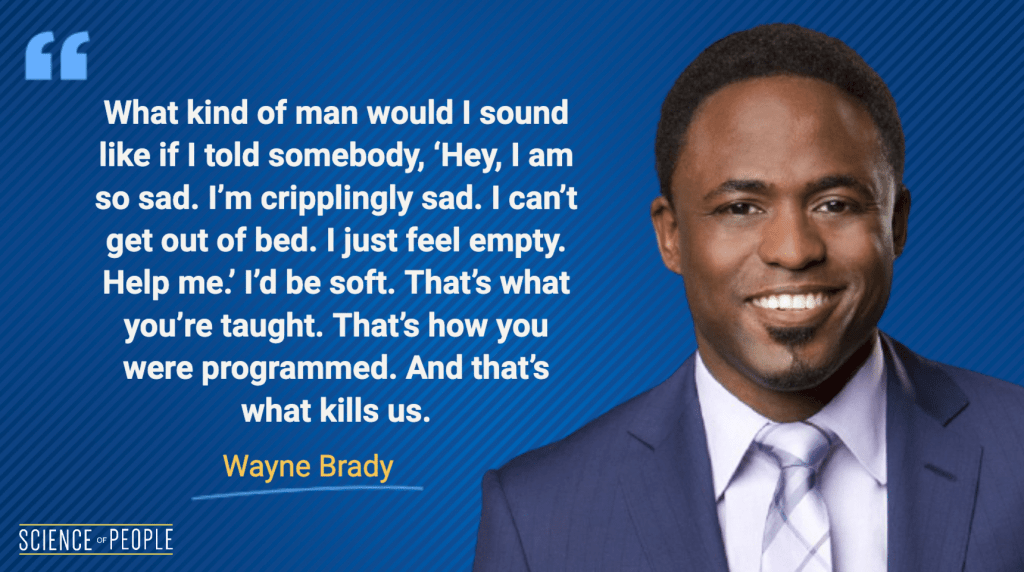
#6: You’re chronically indecisive.
“I’m thirsty for a calling or vocation and a real possibility of making a significant lasting impact but I can’t seem to decide on how to achieve this or in what area of the world I can achieve this in. I face a couple of choices now that will decide my future, but I’m weighed down by a sense of despair and indecision that often translates into procrastination.” — Matthew, Science of People reader
#7: You don’t know what to do.
“I don’t love what I am doing and I am not motivated… all these years I was doing what I should do and not what I loved to do. So what is it that I want to do? I don’t know…” — Laura, Science of People reader
#8: You’ve lost all motivation.
“I felt drained, ignorant for even the slightest of things like the birds chirping outside, and I did not even have the motivation to make food, so I ate anything that I found in the house, even if it was not healthy.” — Jayla, Science of People reader
#9: Your despair shows in your art.
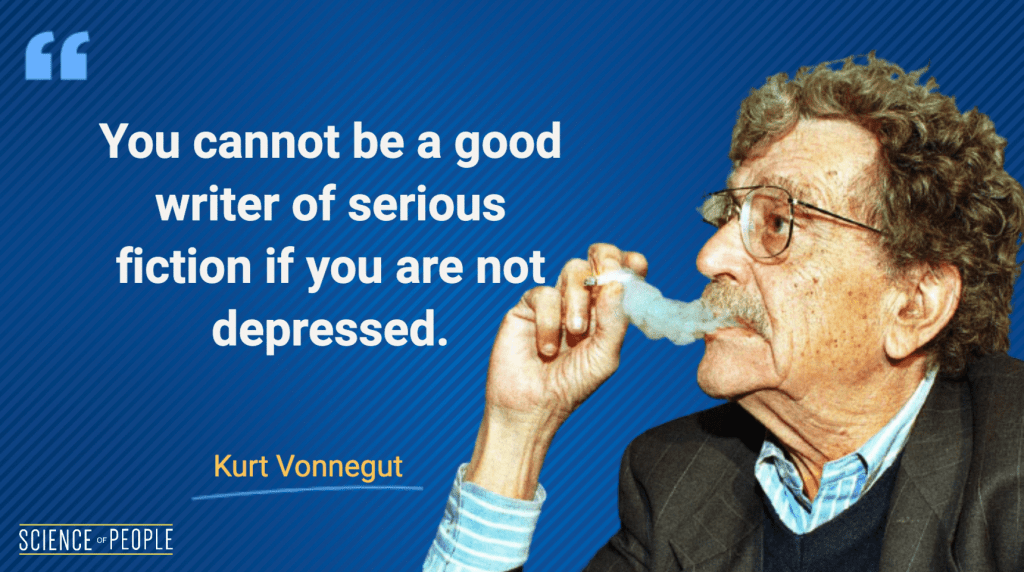
#10: It feels like there’s no end.
“It felt endless and I felt I was going down a dark hole.” — Eva, Science of People reader
How to Get Out of an Existential Crisis
Below, I’ve outlined a 4-step process to get out of an existential funk:
- Examine. What is the cause of your crisis? The better you know your cause, the easier you’ll be able to grieve and move past your crisis.
- Narrate. If you’re telling yourself it’s bad, it’ll only get worse. In this step, we’ll examine your inner narrative and nudge it toward a positive one.
- Find Meaning. Meaning is the driver of action and motivation. Here, we’ll see 7 ways people find meaning and pinpoint yours.
- Take Action. This is the most important step. What actions are you taking to get past your existential crisis? I cover 10 things you can do to help in this step.
OK, let’s dive in!
Step #1: Examine
We’ve already gone over the WHAT… now let’s go over WHY existential crises typically occur.
As you’ve probably figured out, there are many ways a crisis can occur in your life.
Here are the most common:
A change in your environment
“When I became an empty nester I felt completely lost. My identity was so wrapped up in my children that I no longer knew who I was. I went through a dark period trying to find the woman I used to be before I had a family.” — Lorie, Science of People reader
Divorce or breakup of a relationship
“I had lost my second child (premature birth when arguing with my husband over an affair) and husband (He went off with the woman he was having the affair with) and was living as a robot because I had my first child to take care of. It was a difficult time. I felt as if though my mind was transported somewhere else where it was trapped, I cannot remember one thing that had interested me or something I would strive for in life in those 6 years. My body was with my son, I took care of him but as a robot would. I had to get burnt or pricked to react and have a feeling.” — Edith, Science of People reader
Job or career change
“In 2018 I got laid off and was 50 years old. It was the first time in over 25 years that I was unemployed. It was scary to start looking for a job again and not see many good opportunities out there.” — John, Science of People reader
Physical or mental health issue
“I had gained a little weight since college, but between pregnancy and a series of 21 subsequent surgeries, long recoveries, hormonal confusion, steroids, all that radiation from CAT scans… I had gained 200 pounds. My reflection was a stranger.” — Elizabeth, Science of People reader
Death of a loved one
“When my father died and my father in law died within 6 months; I felt there was no point in anything.” — Caroline, Science of People reader
Sudden injury
“In the last ten years, I have lived in 5 different countries outside my home country (France). Soccer has been my secret to learn new languages, rapidly connect with locals and build unexpected friendships. In January, I tore my ACL (key ligament in the knee) at a football practice in Denmark, where I had been living for a few months. This event suddenly stopped my smooth journey into learning Danish, making new friends and practicing a fun hobby I had always loved. I was on to a routine boring life in the dark winter: work, language classes and stupid TV shows at home.” — Léa, Science of People reader
Lack of people interaction
“Extrovert working remotely, less Social Interaction. Less Physical Movement, weight gain, feeling sorry for myself, lack of lust for life.” — Kayla, Science of People reader
What’s your reason for your crisis? You may even be facing a combination of these reasons.
Once you know your reason, you can work on your story.
Step #2: Narrate
I want you to be the hero of your journey. Don’t feel like one? This might take some reframing, but it is essential!
Every hero has a determined path in life that guides them. For example, Harry Potter is the classic underdog-turned-hero who fights against Voldemort’s evil gang. He destroys Voldemort’s Horcruxes to bring peace to Hogwarts.
Every hero’s “narrative” gives them a goal. Something to strive for. Something to fight for.
Let me break it down: there are 4 key elements that are used consistently throughout a hero’s journey:
- Their Identity. This is who a person “is”—their past, their background, their goals, and most importantly, their values.
- The Problem. The thing that must be overcome at all costs.
- The Solution. This takes care of the problem, or at least allows heroes to live with it. Sometimes the solution may not be apparent, but heroes find a way.
- The Payoff. This is what makes the struggle worth it.
Identity. Problem. Solution. Payoff.
- Harry Potter is the classic underdog-turned-hero who fights against Voldemort’s evil gang. He destroys Voldemort’s Horcruxes to bring peace to Hogwarts.
- After Taiwan was invaded, Momofuku Ando gave up his Japanese citizenship and became Taiwanese. While Japan was suffering a food shortage after World War II, he developed the first package of instant noodles known as “Chikin Ramen,” which became a popular food worldwide.
- Katniss Everdeen was a small-town girl from District 12 who was chosen for the 74th Hunger Games. She survived with her friend Peeta and became the victors of the Hunger Games.
Now you probably see how important these 4 elements are to a story. And they’re also important to real life.
I want you to ask yourself:
“What is my narrative? What is my identity, problem, solution, and payoff?”
This could either be way off into the future or something you’re dealing with immediately.
And here’s the thing: most people know their problem and payoff. They know why they’re in a crisis, and they know the amazing thing they could accomplish if they get out of their funk.
But they don’t know 2 things:

These 2 will be covered in the next steps.
**Side Note: If you don’t know your 4 components, that’s OK! Getting out of an existential funk takes time. Give yourself time to relax, and go easy on yourself.
Step #3: Find Meaning
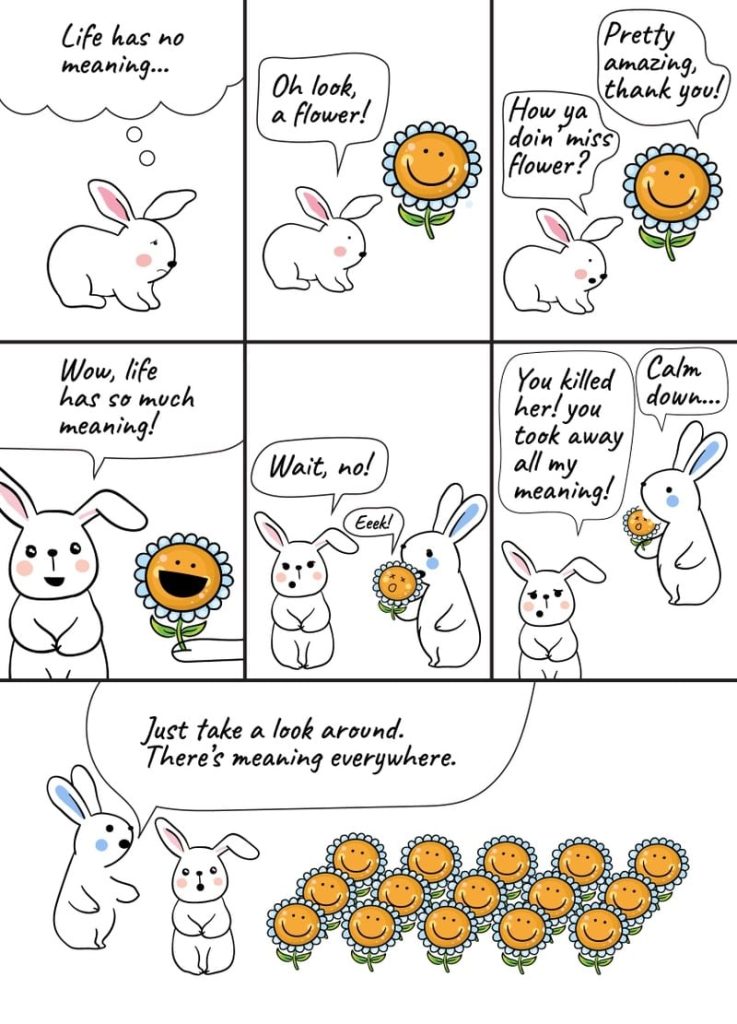
With traditional sources of meaning like marriage, children, religion, and even personal relationships on the decline, we’ve got to create meaning in your life to get you through an existential crisis.
Since your identity is closely tied to the meaning you associate with life, knowing what you stand for will help you make the right decisions.
People in an existential crisis usually forget the most important things in their lives, so to get your brain juices flowing, psychiatrist Irvin D. Yalom offers 7 primary values people derive their meaning from. Which of these types best describes you?
#1: Giver
The Giver is the person who wants to spread a message of happiness to others, even if their own circumstances are less than ideal. People who are Givers tend to be highly altruistic, caring, and are affected by others’ emotions.
Yalom tells a powerful story of a 31-year-old Giver named Sal:
Sal had been an athlete but developed multiple myeloma, a painful bone cancer from which he died 2 years later. He went to different high schools, counseling teenagers on the hazards of drug abuse. The whole audience was stunned when Sal, in a wheelchair and cast, said, “You want to destroy your body with nicotine or alcohol or heroin? You’re depressed and want to throw it off the Golden Gate bridge? Then give me your body! Let me have it! I want to live!”
Now, Sal’s story is powerful, but Givers can do things in their own small ways. They may feel fulfilled by simply providing food for others, or giving a simple gift, or even writing a small thank-you card.
If you’re a Giver, this is a valuable type to have, as truly selfless Givers want what’s best for others.
#2: Devoter (Dedication to a cause)
Are you a Devoter? The Devoter gives up their individual identity to join a bigger cause. They work toward something greater than themselves. Devoters can be housewives, police officers, social activists, and teachers. Devoters want to change the world and want to feel like they belong to a bigger group.
“For many years I searched for what my purpose on this earth was. When I had my first child (7 years ago), a lot of that was lifted when I felt a great purpose in taking care of her. I had two more children after that and eventually I began to search for a deeper meaning and purpose. In a sense, this came back full circle for me as I realized that my children and my husband are a part of my meaning, purpose, spirituality and creation plan.” — Mai, Science of People reader
If you’ve ever seen the movie Fight Club, a great example of a Devoter would be Tyler Durden. Tyler forms a group called Fight Club, which has the values of anti-materialism and freedom, and devotes his life to spreading its ideals.
#3: Creator
Are you a Creator? Do you get that feeling of excitement when you’ve got a brilliant idea, or express yourself, or get to use innovative ways to solve problems?
Creativity is such an important part of our lives that studies show creative activities contribute toward an “upward spiral” of positive emotions and improved physical and mental health.
Creative expression gives us a sense of purpose in life.
Creators aren’t only found in fields like art or music, either. Creators can be found everywhere, from your everyday bookkeeper who finds unique ways to organize books, to the salesman who comes up with innovative ways to increase sales, to the gardener who plants beautiful arrangements of flowers.
Creativity can be found in anything, and if you’re a Creator, you thrive on expressing yourself to the fullest.
#4: Pleasure-seeker
Pleasure-seekers see the world as a gift. They naturally dive deep into the world, seeking out what it has to offer. If you’re a pleasure-seeker, you might:
- enjoy the moment
- take delight in the small things
- seek bigger thrills by traveling
- love adrenaline-pumping activities
- look for ways to feel good in every situation
Pleasure-seekers must be cautious, however, as their love for pleasure may lead to addiction or even self-harm.
#5: Achiever
Achievers strive for success. They dedicate themselves to their goals so they can realize their built-in potentials. Achievers can be found in athletes, CEOs and managers, intellectuals, and in extreme Guinness World Records holders.
Achievers often are introverted and seek mastery in an area. Some Achievers may even feel bored once they reach the peak, so they might shift their goals to another area.
“Finding success, no matter how small, in another arena of life [helped during my crisis].”
—Imogen, Science of People reader
#6: Harmonizer
Have you ever seen the movie Cloud Atlas? I think this movie is a masterpiece. The idea behind it is that everyone’s life is interconnected—when one person’s life ends, their “soul” travels on to another body at a different time period, which is influenced by their past life.
Very Buddhist, really.
But you don’t have to be a Buddhist to appreciate the film or to be a Harmonizer. Maybe you’re always asking yourself what the meaning of life is? Or wondering about the afterlife?
Harmonizers have the unique trait to fully immerse themselves in the world. They’re not preoccupied so much with themselves but have a stronger concern with the world around them or the “spiritual” side of things.
They may be religious or dedicate themselves to higher goals that leave the world a better place, such as ending poverty or achieving harmony with others around them.
“I realized that God saw value in me despite me not being able to see it myself.”
—Josiah, Science of People reader
#7: Shaman
George Vaillant, who conducted a megastudy on Harvard undergraduates, found that successful men in their forties and fifties worried less about themselves and more about children. Naturally, many older people are Shamans, and they devote their meaning to imparting their knowledge to children.
“When I am in crisis, I feel hopeless. There are a number of factors that bring me back to the path. These include having wonderful friends, better job opportunity than most, and a responsibility I feel towards the future of my children. I also feel myself responsible towards the lives of my people—who happen not to enjoy similar opportunity and hence require the support of people like me.” — Farhad, Science of People reader
Shamans pass the torch to future generations so they can flourish and learn from our mistakes.
Which of the 7 types do you gravitate toward the most? This is your meaning or your purpose. Knowing your type, you can then take action that aligns with your meaning.
Step #4: Action
Now it’s time to take action. Existential crises often leave you in a slump, so first of all, I want to say:
Sometimes time can heal
“Time. Over time, I healed and started slowly coming out of it. That, and the emotional support of loved ones who cared about me.”
—Chloe, Science of People reader
If you’re in a slump, take things one step at a time.
No need to dive in head first! Take small steps, and only when you are ready. Oftentimes, a traumatic event or illness takes time to recuperate from.
A Cambridge study found that grief symptoms of 288 bereaved people tended to peak at 4–6 months after a loss of a loved one, then decline gradually over a 2-year period.
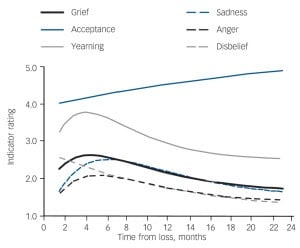
… So if you’re still within that 2-year curve, don’t stress! Give things time, and let the grief or sad feelings run their course. Eventually, with enough time, they may diminish. Or, at least, you can learn to cope with your thoughts better.
Give your thoughts a name
Are you constantly asking yourself why you’re here? Unless you’re a holy priest or Zen monk, you likely won’t find the answers easily… or even ever.
In one study of athletes, 4 different types of self-talk were analyzed:
- positive
- negative
- instructional
- motivational
… and can you guess the only self-talk that predicted success?
The only self-talk that leads to success is positive self-talk.
Things like “You can do it!” or “I am worthy of what I have” are simple things you can tell yourself to give you a success boost.
I want you to be aware if these thoughts are popping up in your mind:
- “What is the purpose of life?”
- “Why should I do anything?”
- “I hate myself. I am useless.”
- “Why is life so miserable?”
Everyone has negative thoughts, so let’s give these thoughts a name.
Since I love Mean Girls, I call the negative thought-maker in my life Regina (sorry to all the Reginas out there!).
Regina, being the mean girl she is, loves to make a scene:
- Before getting on stage for a presentation. Regina: “You’re going to fail!”
- When I wake up in the morning. Regina: “Another day! You’re getting older and wasting life!”
- When I’m drying my hair. Regina: “Ew! You’ve got split ends.”
I want you to make friends with your Regina.
Let’s face it. Your Regina will be with you for a long time. Maybe forever. So it’s best to make friends and accept Regina as a (nasty but harmless) part of your life.
And if she talks? Give her a smile, and trudge forward. Over time, if you deal with your Regina with enough compassion, she may turn into a nice girl one day (or at least you’ll learn to live with her!).
Make a choice
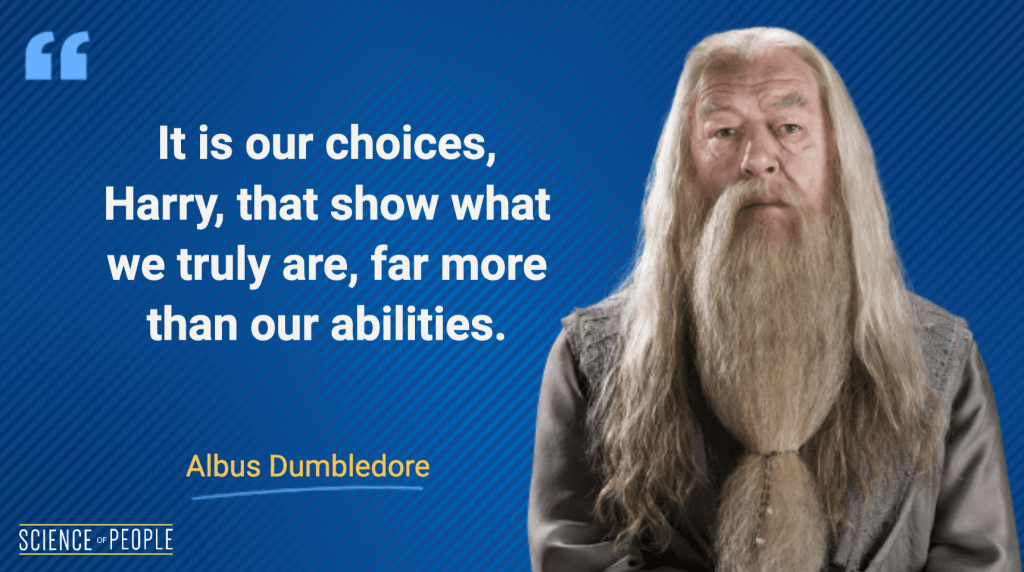
For those of you who are faced with a crossroads and have to make a choice, I want you to rely on your deepest meaning we talked about earlier.
- Are you an athletic Achiever deciding which sport to choose? Choose the thing that you’re good at and will make you feel the most success.
- Are you a Harmonizer and stuck between choosing a noble goal or a career with lots of income? Choose the noble goal to feel deeper meaning.
- Are you a Giver, but don’t know what to do? Start giving to others. Feel the joy and happiness that comes with giving.
Sometimes it takes some quiet time to dig deep, but only you will truly know the best choice for yourself.
Know your time isn’t forever
I’ve always been a huge fan of Stoic philosophy, especially Ryan Holiday’s books. The Stoics, in particular, thought death actually makes life happier.
And since people undergoing an existential crisis have been shown to think about death more often, it’s important that one’s own death is seen as a positive and not a negative.
Here’s what they thought: Because you allow yourself to think of your potential death, you’ll live life to the fullest. People who think about death have even been shown to have improved physical health and re-prioritized goals.
“Probably the best remedy however has been discussing the nature of life and death with a couple of my close friends—insights reached via late-night chats have really really helped me.”
—Matthew, Science of People reader
While death is a serious topic, it can also be used as a motivator to take control of your life and live every day to the fullest.
Ask yourself: “What can I do today to push myself toward feeling accomplished in my life?” You can also try the obituary exercise:
- Imagine you are on your deathbed and a friend or family member is tasked to read your obituary.
- What does your ideal obituary sound like?
Do you want them to say you’re funny, lived happily, were successful, or lived life to the fullest? What do you want to be remembered for?
When you write down your ideal obituary, you can move toward becoming that type of person you want to be.
Cut the goods
Now, I’m very guilty of the 3 Fs.
Food, furniture, and frappuccinos.
I like to buy them. And maybe you like to buy stuff, too.
But let’s put it this way: Buying stuff likely isn’t going to make you happier and likely isn’t going to end an existential crisis. Studies even show that no matter when happiness is measured (before, during, or after), experiences have been shown to make people happier than material objects.
So instead of browsing Amazon, enjoy an experience you’ve been craving. Treat yourself to the spa, or even take a nice bubble bath with candles and night-time jazz.
Is there something you’ve been wanting to experience but haven’t? Give yourself permission to enjoy.
And while you’re at it, why not try a declutter? You may have a lot of stuff lying around… but do you really even wear those ugly sweaters you got last Christmas?
I’m going to tell you about a cleaning method that changed my life. Yes, I know… it’s cleaning. Big deal, right?
But it’s no joke. It’s called the KonMari method:
- First, commit to tidying up. You can even set a timer to get motivated.
- Next, visualize what your ideal life looks like. Do you want to be successful? Happier? What does this environment look like?
- Organize your items by category, such as clothing, electronics, or bags.
- Discard the items you rarely use. My go-to is if I haven’t used it in the past 6 months, it’s time to go. Before throwing them away, thank them for “serving their purpose.”
- Bonus tip: If you’re having trouble deciding, ask yourself, “Does this item spark joy in my life?”
Cleaning may seem tedious, but it’s a great way to “start fresh” and have a happier environment.
Forward momentum
I want you to focus on your immediate goals. I know this might sound obvious, but when you really get stuff “done,” it’s an immediate relief and one less burden to carry.
For example, last week I had to finish the conclusion to an article I was writing, but Sienna wanted to play games. I made a 10-minute exception… which, unfortunately, turned into over an hour. While it was fun playing with Sienna, I nearly missed my own personal deadline, just so I could have some play time.
Can you relate?
“[What helped me was] taking my mind off of things and focusing on things that needed to get done, like school.”
—Olivia, Science of People reader
Let me make this clear…
Getting your small, immediate goals done first thing will immediately PUSH you toward an upward spiral of positive emotions. Right away, you’ll start your day off with forward momentum.
Brian Tracy talks a lot about this, and he calls it the Eat That Frog technique. Essentially, do your biggest task first, and the rest of your goals will seem easier.
So the next time you need to get something done… try doing the thing that’ll have the biggest impact in your life.
Shift
Some of our readers faced this dilemma: They were stuck in a job they hated or lost passion for and didn’t know what to do.
As you know, this is a big dilemma if you’ve been stuck in a career path for long.
But it doesn’t need a dramatic shift. Sometimes all it takes is a small one. If you’re unsatisfied where you are right now, I’d like to ask:
What are you doing now? And what other skills can you combine to create a successful shift?
For example, let’s say you start an emailing company. You think it’s a cool idea to email your friends recommendations for restaurants or other nearby establishments. But it fails. Nobody reads the emails or really cares, for that matter. However, if you shift into a business that lets others write reviews of local businesses… then it might be worth a million. This was the case for Yelp, who changed course once they found their audience.
The bottom line is this:
If you’re stagnating, you should be looking for a challenge to help you grow.
“I attended a study group… and also discovered a new area of professional interest… This enables me to learn new things and still be a lawyer. Now I just need the necessary training and I can move ahead with my new career.”
—Adeola, Science of People reader
Travel
When I was in my college years, travel was a breeze. I made new friends, ate the best food in my life, and found the love of my life!
Travel is great because you hit the reset button. It’s a pause to your past life and an “escape” to a different world. It’s a chance for a new you. And travel brings you new, emotional experiences, which have been shown to construct meaning in people’s lives.
“It took a lot of soul searching to discover that I could be whoever I wanted to be now. So I started trying new things, went back to school, and found a love for travel that wasn’t available to me before.” — Lorie, Science of People reader
If you have the chance in the future, I would highly recommend going for it. I believe everyone who travels will have a greater appreciation for life and what they have.
Realize you’re not alone
Have you ever been struck with the thought that you’re the ONLY human going through an existential crisis right now?
I mean, you don’t hear about it often on social media or from coworkers.
But at the same time, countless others are undergoing their own existential crises as well.
“Reading about other people’s stories [helped me], what they did to get through the struggle and then realizing I’m not alone in all of this.” — Mathys, Science of People reader
I want you to know that truly, you are not alone. We are here for you, and if you’re undergoing a hard time in life right now, it will end in the future.
Therapy
If all else fails, try therapy. Seeing a trained mental health professional sometimes has a stigma attached, but science shows therapy significantly increases attitude to life.
“I knew that hit rock bottom the day I went to a psychiatrist although I hate them very much. But I had no choice but to go for it.” — Rihem, Science of People reader
Many famous celebrities have gone through therapy:
It might not be glamorous, but therapy is crucial if you’re going through an extreme crisis. It’s all about introducing someone who has experience who can see your life objectively.
If you think you need therapy, please seek help. Here are some crisis services worldwide that are trained to provide support, courtesy of Reddit:
https://www.iasp.info/resources/Crisis_Centres/
http://www.suicidepreventionlifeline.org/GetHelp/LifelineChat.aspx
http://www.samaritans.org/how-we-can-help-you [UK]
https://www.lifeline.org.au/Get-Help/ [AU]
Remember—existential crises take time. Each step you take toward climbing out WILL affect you on a deeper level. And every step you take, your ability to be happier and healthier will become clearer.
I hope you found this guide helpful in your journey! And if you have any thoughts or want to leave advice for others, feel free to leave a comment below.
To your happiness,
Vanessa




